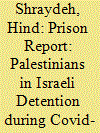| Srl | Item |
| 1 |
ID:
187000


|
|
|
|
|
| Summary/Abstract |
Using feminist anthropology and interview data, this article investigates the gendered dimension of hunger striking in Israeli prisons. It draws on other cases from Ireland to the United States to explore the gendered nature of resistance to political imprisonment. I argue that women hunger strikers are active participants who weaponize their lives to resist the Israeli matrix of power and patriarchal societal norms. There have been less women in number when compared to male prisoners, but women have been more effective in collectively coordinating their pioneering action. Through necroresistance (transforming their body to a site of resistance) and the strategy of sumud (Arabic for ‘steadfastness’), women prisoners practice a dual resistance of the colonial authorities and the patriarchal society — simultaneously reclaiming ownership of their bodies and lives from both systems. This does not entail constituting their bodies as masculine (or de-feminizing themselves) so they are protected from sexual abuse. Rather, they insist on feminizing their experience and challenging gendered stereotypes of women as ‘victims’ with ‘fragile bodies’. For them, gender is not a barrier but a motivational factor in which self-sacrifice to protest injustice is far superior to enduring the wrongs of political imprisonment.
|
|
|
|
|
|
|
|
|
|
|
|
|
|
|
|
| 2 |
ID:
145604


|
|
|
|
|
| Summary/Abstract |
The Palestinian experience has been aptly characterized as carceralism, in both literal and metaphorical senses. It is arguable that ever since the 1967 occupation of the West Bank and Gaza, the most consensual pillar of national Palestinian discourse has been the issue of Palestinians imprisoned by Israel. After Hamas’s so-called takeover of Gaza in 2007, however, a new, intra- Palestinian carceralism emerged. This article traces the shifts in Palestinian representations and experiences of the carceral post-2007, their historical resonances in the late Oslo era, and their implications for Palestinian unity after nine years of division.
|
|
|
|
|
|
|
|
|
|
|
|
|
|
|
|
| 3 |
ID:
174254


|
|
|
|
|
| Summary/Abstract |
This first-person account, written by the partner of a Palestinian prisoner, brings to life detention conditions in Israeli prisons that have been well documented by human rights and other organizations. It highlights the particular dangers these carceral facilities pose to the men, women, and children being held—many in so-called administrative detention, without trial or charge—during the Covid-19 pandemic. Part reportage and part cri de coeur, this testimonial touches on the most immediate and existential aspects of imprisonment for Palestinians in Israeli prisons: poor sanitary conditions and insufficiency of Covid-19 mitigation measures, as well as systemic medical negligence, such as the withholding of medical care at a time of heightened threat and greater vulnerability.
|
|
|
|
|
|
|
|
|
|
|
|
|
|
|
|